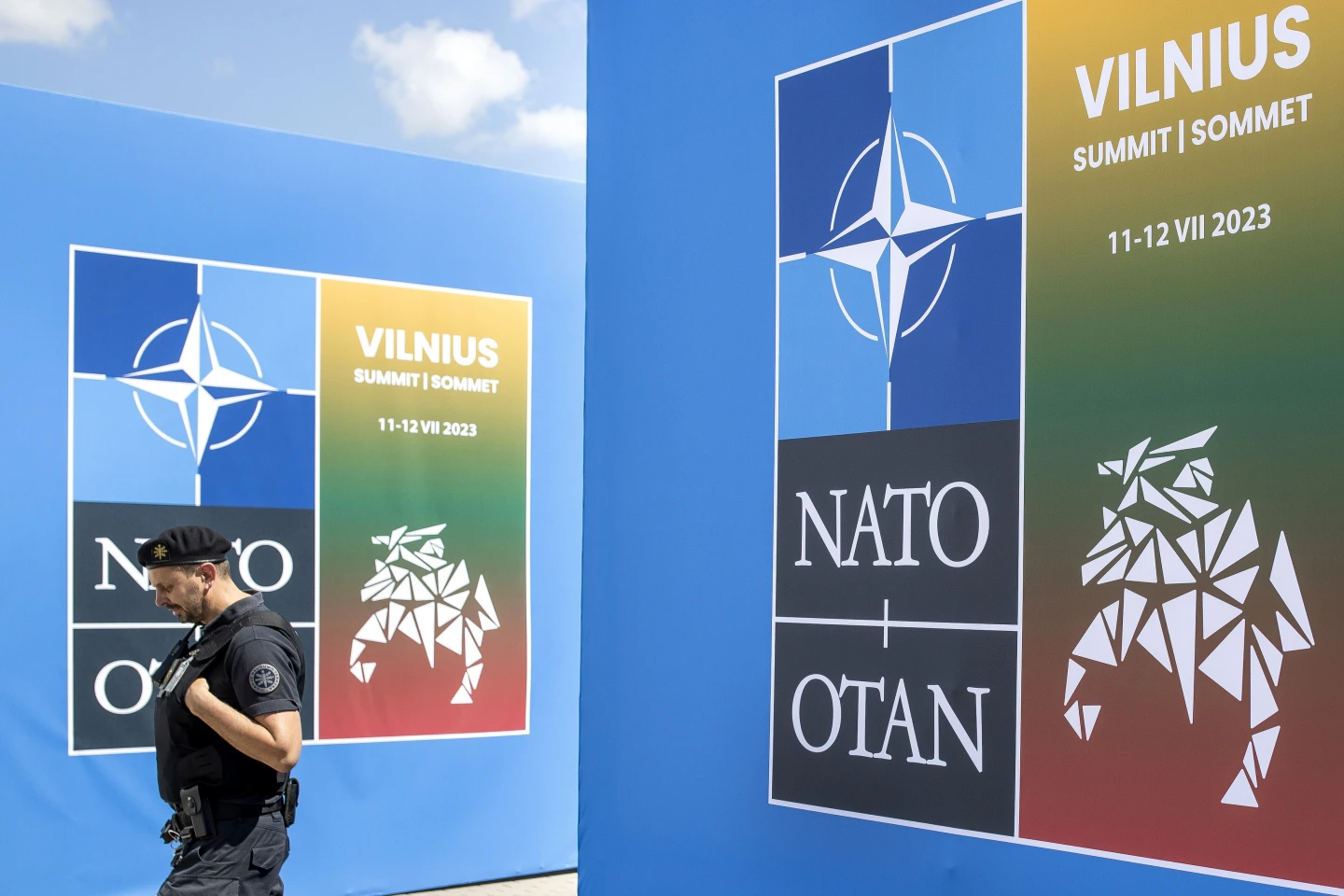VILNIUS, Lithuania (AP) — Sweden, a traditionally neutral country, and Finland jointly sought NATO membership with the anticipation of a swift accession process. However, despite Finland successfully joining the alliance over a year ago, Sweden remains in the waiting room.
The admission of new members requires the approval of all existing NATO nations. As leaders convene for a summit in Vilnius, Sweden finds itself awaiting the green light from two countries: Turkey and Hungary.
A significant hurdle was overcome on Monday as Turkey’s president agreed to submit NATO’s accession documents to the Turkish Parliament for approval, a step that had been previously refused for over a year. With this development, Sweden is now on the verge of becoming the 32nd member of NATO, although it has not yet crossed the finish line. Here’s an overview of Sweden’s tumultuous journey toward joining the alliance.
BIDDING FAREWELL TO NEUTRALITY For a country that has not engaged in armed conflict for two centuries, the decision to join NATO carries immense significance. Sweden maintained its neutrality during both world wars and throughout the Cold War, viewing it as a fundamental pillar of its security policy and even its national identity.
Although Sweden adjusted its stance to “nonaligned” after joining the European Union in 1995 and gradually increased cooperation with NATO, until last year, Stockholm firmly rejected the idea of seeking membership, primarily due to strong public opposition.
As recently as November 2021, just three months prior to Russia’s full-scale invasion of Ukraine, Sweden’s then-Defense Minister Peter Hultqvist declared that his center-left Social Democrats, while in power, would never pursue NATO membership.
However, everything changed when the war broke out. As Russian tanks crossed the Ukrainian border and missiles struck cities like Kyiv, public opinion in both Sweden and Finland underwent a significant shift. Even Hultqvist and the Social Democrats reversed their position, leading to Sweden and Finland jointly applying for NATO membership in May of the following year.
A HITCH IN THE PLANS: TURKEY’S OBJECTIONS While many observers anticipated swift processing of Sweden and Finland’s applications, given their fulfillment of membership criteria and the added urgency following the Ukraine war, Turkish President Recep Tayyip Erdogan presented a different perspective. Erdogan expressed that Turkey could not readily embrace the Nordic nations as NATO allies unless they took decisive action against groups that Ankara considers security threats, including the banned Kurdistan Workers Party (PKK), which has been engaged in a decades-long insurgency in Turkey.
In recent decades, Sweden has demonstrated its commitment to humanitarian efforts by accepting over 1 million refugees, including tens of thousands of Kurds from Turkey, Iran, and Iraq. Some of these refugees sympathize with the PKK, a group designated as a terrorist organization by the European Union.
To address concerns raised by President Erdogan, Finland and Sweden reached an agreement with Turkey during last year’s NATO summit in Madrid. The agreement involved the resumption of weapons exports to Turkey (which had been suspended after a Turkish military operation in northern Syria in 2019), tightening anti-terror laws, and intensifying efforts to prevent PKK activities within their respective countries.
Following the election of a center-right government in Sweden last September, negotiations with Turkey were expected to become somewhat smoother, as the previous Social Democratic government had faced challenges due to its support for Kurdish militants in Syria associated with the PKK.
However, complications arose in January when pro-Kurdish activists briefly displayed an effigy of President Erdogan from a streetlight outside Stockholm’s City Hall. Subsequently, an anti-Islam activist from Denmark burned the Quran outside the Turkish Embassy in Stockholm.
These incidents, seemingly aimed at derailing Sweden’s NATO bid by provoking Turkey, had the desired effect. Ankara suspended NATO talks with Sweden while permitting Finland to proceed with its accession in April. Prime Minister Ulf Kristersson’s conservative government in Sweden worked tirelessly for months to mend the damaged relationship.
Just as relations seemed to be improving, a refugee from Iraq staged another Quran-burning protest outside a mosque in Stockholm last month. This development further dampened hopes of Turkey unblocking Sweden’s accession prior to the NATO summit in Vilnius.
The protests in Sweden against President Erdogan and the Quran burnings have attracted participants from various groups, including pro-Kurdish and far-left demonstrators. Some individuals have displayed PKK flags during the protests. Although these incidents might not have garnered much attention if not for the NATO spotlight, they made headlines in Turkey and other Muslim countries. Leaders in these countries criticized Sweden for allowing such actions. This has sparked a discussion within Sweden about whether Quran-burning can be considered incitement to hatred, which is illegal, or a lawful expression of opinion about a world religion.
Swedish officials are attempting to assure Turkey that Sweden is not an Islamophobic nation. They emphasize that the government does not condone Quran-burnings but also state that they cannot prevent them due to freedom of speech protections. However, the government’s strong condemnations of the protests have faced criticism domestically, with some accusing Prime Minister Kristersson of going to great lengths to appease Turkey.
There are suspicions of Russian interference in these events. Sweden’s security service issued a warning when the country initiated its NATO membership bid, stating that Moscow might increase its influence activities during the application process. However, no evidence has emerged linking the protesters to Russian involvement.
In terms of Turkey’s desires, they have made it clear that Sweden needs to address their concerns regarding security threats and the PKK. Turkey expects Sweden to crack down on groups it considers threats, including the PKK, as a condition for supporting Sweden’s NATO accession.
Turkey’s delay in approving Sweden’s NATO membership has caused frustration among the United States and other allies. Some analysts have suggested that Turkey may be using its leverage to push for upgraded F-16 fighter jets from the US. While Turkish and US officials have stated that the Swedish accession process and the F-16 upgrades are not directly connected, President Joe Biden implicitly linked the two issues during a phone call with President Erdogan in May. Biden mentioned that Turkey still wanted to work on the F-16s, but he emphasized the importance of reaching a deal with Sweden.
Just before departing for the NATO summit in Vilnius, Erdogan presented yet another demand. He called for European countries to reopen frozen talks on Turkey’s accession to the European Union, stating that when they pave the way for Turkey, they will do the same for Sweden as they did for Finland.
Following separate meetings between Erdogan, Prime Minister Kristersson, and EU Council President Charles Michel in Vilnius, NATO’s Secretary-General announced a breakthrough. Erdogan was willing to submit Sweden’s accession protocol to the Turkish Parliament in exchange for enhanced security cooperation and Swedish support in reviving Turkey’s EU membership aspirations. While Kristersson hailed the agreement as a significant step toward NATO membership, he refrained from declaring it a done deal, as the timeline for the Turkish Parliament’s decision remains uncertain.
Regarding Hungary’s stance, unlike Turkey, Hungary has not provided a reason for its delay in ratifying Sweden’s NATO membership. Hungary had cultivated close economic and diplomatic ties with Russia prior to the war, and Prime Minister Viktor Orban has refused to support Ukraine with weapons and has spoken against EU sanctions on Moscow.
During a recent visit to Vienna, Orban denied that Hungary was intentionally delaying Sweden’s membership bid, stating support for Sweden’s accession but indicating that the Hungarian Parliament had not yet ratified the decision. Many analysts speculate that Hungary is waiting to see Turkey’s next move and that it will approve Sweden’s accession if Turkey appears likely to do the same, mirroring the situation with Finland’s accession.
[Associated Press writers Justin Spike in Budapest and Geir Moulson in Berlin contributed to this report.]






























